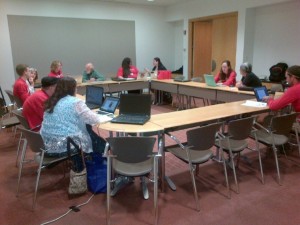The students in my “Building Your Author Platform” class have been busy. We spent the first couple weeks of this class figuring out who we are as writers and who we need to be out there online. They thought about what they write, their interests in both reading and writing, where they want to take their writing, and who they want to meet out there and add to their “tribes.” I have a couple of students who write psychological horror/thrillers, several who write fantasy/sci-fi, a Star Wars fanatic, some YA writers, a student who doesn’t want to write but wants to promote books (bless her!), a scientific writer (she even has a moth of the month you can learn about!), and a couple who are also just multi-talented and still figuring it all out.
They then built their websites to go along with the sort of “brand” they’re creating of themselves. Then, following principles of literary citizenship, we’ve talked about how the best way to “network” is not to “network” per se but to simply to be interested in what other people are doing. They’re writing charming notes each week to someone they admire. They’re following and commenting on one another’s blogs and blogs of writers they admire and want to add to their tribe. They’re tweeting (and tweeting and tweeting and tweeting . . .).
I love it when a student stops by my office to say, “My tweet just got ‘favorited’ by my favorite author!” and they begin to realize that reaching out simply means a tweet, a retweet, or a kind comment on a blog. I want them to understand that, once they leave this college cocoon where they’re surrounded by likeminded writers who understand them, they will be out in the bigger world where, chances are, fewer people “get” them as writers. They will need that online “tribe” that continues to discuss the various virtues of the new Star Wars trailer or the plot line of the latest Brandon Sanderson book or whether their own character in the latest story is speaking in a believable way (“Let me just read you this . . .”). The tribe is a place where they can continue to join the conversation about things that matter to them.

I tell them that they will need to attend a writers conference — hopefully once a year — to get recharged and reinvigorated. They will need to continue to buy and read books (that doesn’t seem to be an issue with this group).
This past week we also listened to the pitches of those students who have books in the works. I wanted them to both practice writing proposals and pitching those proposals to agents. Half the class is in that position, so the other half acted as agents and I gave the authors five minutes to sit down in front of an agent, give their book’s synopsis, and be calm and professional all at the same time. It was great practice for that opportunity they will have sooner or later to actually pitch that finished book.
Platform building isn’t all about me, myself, and I — which I think is why many people are scared of it. No, platform building is about building a network of likeminded folks both in your physical world and online — caring about them, sharing their work and their words, joining the conversation, and rejoicing with the successes that happen in the group. Then, one day, when success comes knocking on my students’ doors (as I have no doubt it will), they have a group ready to celebrate with them.
One board at a time. Reach out to your favorite authors in your genre. Thank them for something. Comment on their blog posts. Share your work and your thoughts on your own blog. Take your time, because it will take time. But the time to start is now–even if you don’t have a book to sell. Just go out there and join the conversation. You have something important to say.






